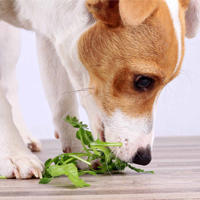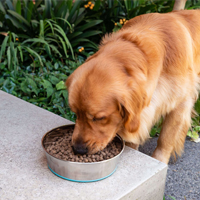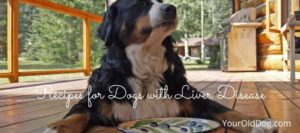
Routine Tests for Older Dogs & What The Tests Reveal
Whiles exams are important for all dogs, routine tests for older dogs are critical.
Veterinarians say that size plays a role in how your dog ages.
But, I don’t necessarily agree. I’ve had large dogs my entire life and most lived to be 15-17 years old and in good health. This has a lot to do with care and nutrition, and little to do with the dog’s size.
However, that’s an entirely different article that we’ll save for another day. 🙂 Regardless, if your dog is older, you need to make sure that your senior visits the vet on a routine basis for exams and testing.
Routine Tests For Old Dogs – How Often Is Necessary?
Although we tend to think that since our dog’s aren’t showing any symptoms of health problems, then everything must be okay. Unfortunately, dogs are really good at masking pain and other problems and this allows us to relax.
Whether your dog is currently a senior or just approaching old age; try to remember that many diseases and other health problems can be managed or even cured if caught early enough.
Most vets recommend seeing your senior dog twice a year. I typically have larger dogs, so I’ve always stuck to that schedule once my dogs reach the age of 8 or 9.
First The Physical Exam
The first routine test your dog will undergo is the the standard physical exam. Your vet will examine your older dog including his overall attitude as well as his appearance. He’ll want to know if his demeanor is happy or sad. He’ll check out his eyes, nose, ears and mouth.
The vet will look at your furry senior’s skin, nervous, respiratory, digestive, urinary, circulatory and musculoskeletal systems as well. The vet will take your dog’s temperature so he knows whether it’s within normal parameters.
Complete Blood Count (CBC)
A complete blood count aka CBC is a vital in determining whether your senior is healthy or not. A CBC defines the quality and quantity of actual cells in your dog’s blood.
Serum Chemistry Profile
A Serum Chemistry Profile aka Chem Screen (or chem scan) includes an extensive amount of tests that provide the doctor with an wide range of information on the general health of your old dog.
The Chem Screen confirms the results of the actual physical exam and provides EARLY WARNING SIGNS of unsuspected health problems. Typically they ask that you fast your dog for 12 hours in order to get accurate results.
If you’re not sure, call them and ask whether a 12 hour fast is necessary (including water).
Urinalysis
Your dog’s vet can tell a lot by a urinalysis, so be sure to take a urine sample with you when you go. This simple routine test for old dogs (all dogs) tells the vet what’s going on with the kidneys and bladder, the liver, pancreas and other organs as well.
Collecting The Urine For The Sample
It’s pretty simple to collect a urine sample, but make sure that you use a clean, dry container to collect it.
While holding the container and as your dog starts to urinate, just place it under him or her to catch it (you don’t need that much and you don’t need to place it right up against the dog – you might scare him). If your dog’s appointment is within 2 hours, there’s no need to refrigerate it. If your appointment is over two hours, refrigerate it.
Fecal Test
You’ll also need to take a stool sample (take a fresh one) from your old dog for a fecal analysis. This test shows the presence of parasites and undigested food particles such as muscle, fat and starch indicating that your dog is having difficulty breaking down his food. A good brand of Digestive enzymes can help a great deal with breaking down the nutrients in your dog’s food.
Collecting The Stool Sample
You only need about 1 tablespoon of fecal matter, but make sure that it’s less than 24 hours old. If it’s older than 8 hours, put it in a tightly sealed container in refrigerator.
It really is important to have a routine exam done on your older dog every six months. If something is going on with your furry senior; the vet may need to see the dog more often in order to better monitor the issue.
Talk to your vet and don’t be afraid to ask questions. If your vet’s bedside manner seems cold or offensive – get a new vet.
You want a vet that cares just as much about your old dog as you do! I’m partial to holistic veterinarians myself, because I believe in healing the entire body and not just masking symptoms.










